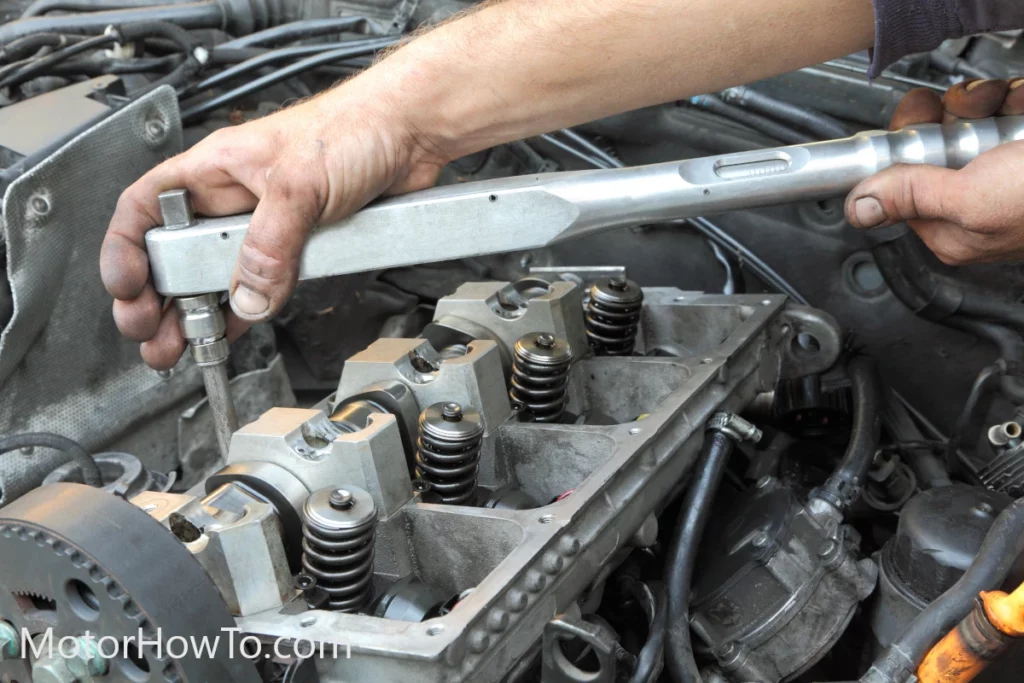In the ever-evolving world of automotive engineering, the debate surrounding engine performance often hones in on the intricacies that differentiate one model from another.
Within this realm, a prevailing discussion has emerged juxtaposing two specific engine sizes: Chevrolet 6.0 and Chevrolet 8.1.
The Chevrolet 6.0 engine typically offers better fuel efficiency and is sufficient for most daily driving needs. On the other hand, the Chevrolet 8.1 provides more power and torque, ideal for heavy-duty tasks, but may compromise fuel economy. Reliability varies by make and model rather than engine size alone.

This comparison seeks to delve into their merits and potential shortcomings without necessarily advocating for one over the other, aiming to provide readers with a comprehensive understanding of both.
Related:
- LMM vs. LBZ (Comparison of Duramax Diesel Engines)
- 1500HD vs. 2500HD (Comparing Two Powerful Trucks)
- Which is Quieter: CRV or RAV4? (Comparative Analysis)
Introduction to Engine Sizes: Chevrolet 6.0 and Chevrolet 8.1
Chevrolet 6.0 and Chevrolet 8.1 refer to two distinct engines manufactured by Chevrolet, a well-known American automotive company.
These engines are part of Chevrolet’s diverse lineup and have been used in various vehicles over the years.
The numeric representation, such as 6.0 or 8.1, refers to the Chevrolet engine’s displacement, which is essentially the total volume of all the cylinders combined, measured in liters.
The 6.0 and 8.1, while just numbers at first glance, encapsulate a world of engineering prowess, potential power, and performance capabilities.
These particular sizes often target different market segments, with nuances in their design and application that set them apart in the automotive landscape.
Chevrolet 6.0
The Chevrolet 6.0, also known as the GM 6.0-liter Vortec V8 engine, is a robust and powerful engine known for its versatility and performance. It belongs to the Vortec family of engines, which are renowned for their reliability and capability.
The “6.0” denotes the engine’s displacement, which is approximately 6.0 liters. This engine is commonly found in Chevrolet and GMC trucks and SUVs, as well as in certain commercial vehicles.
It is valued for its towing capacity, making it a popular choice for those who need to haul heavy loads.
Chevrolet 8.1
The Chevrolet 8.1, also known as the GM 8.1-liter Vortec V8 engine, is a larger and even more powerful engine in the Vortec family.
With a displacement of approximately 8.1 liters, it is one of the largest gasoline V8 engines ever produced by Chevrolet.
This engine is celebrated for its high torque output, making it ideal for applications that demand substantial power, such as heavy-duty trucks and recreational vehicles (RVs).
The 8.1-liter engine was often used in Chevrolet’s Silverado and Suburban models and was appreciated for its ability to handle demanding towing and hauling tasks.
Both the Chevrolet 6.0 and 8.1 engines reflect Chevrolet’s commitment to providing a range of engines to meet the diverse needs of their customers. These engines have played a significant role in powering a variety of Chevrolet vehicles, showcasing the company’s dedication to performance and reliability in the automotive industry.
Breaking Down Performance Metrics
Let’s break down the performance metrics of the Chevrolet 6.0 and Chevrolet 8.1 engines.
These metrics provide insight into the power, torque, and capabilities of these engines.
Chevrolet 6.0 Engine:
- Displacement: The Chevrolet 6.0 engine has a displacement of approximately 6.0 liters.
- Horsepower: This engine typically produces between 300 to 360 horsepower, depending on the specific model and application. Some performance variants can produce even more power.
- Torque: Torque output generally ranges from 360 lb-ft (pound-feet) to 380 lb-ft, again varying based on factors like vehicle type and model.
- Applications: The 6.0 engine is often found in Chevrolet and GMC trucks, SUVs, and commercial vehicles.
- Towing Capacity: It is known for its towing capacity, with the ability to tow heavy loads, especially when equipped with appropriate towing packages.
Chevrolet 8.1 Engine:
- Displacement: The Chevrolet 8.1 engine has a larger displacement of approximately 8.1 liters.
- Horsepower: It typically produces between 320 to 340 horsepower, offering substantial power for its applications.
- Torque: The 8.1 engine is known for its high torque output, with numbers ranging from 440 lb-ft to 455 lb-ft or more. This high torque makes it ideal for heavy-duty tasks.
- Applications: The 8.1 engine was commonly used in Chevrolet Silverado and Suburban models and found in heavy-duty trucks and RVs.
- Towing Capacity: Thanks to its torque, it excels at towing and hauling heavy loads and is favored by those who need exceptional towing capabilities.
Both engines are known for their performance, with the 8.1 offering more power and torque due to its larger displacement. These metrics make them suitable for a range of applications, from everyday driving to heavy-duty tasks like towing trailers and recreational vehicles. The choice between the two often depends on the specific needs and requirements of the vehicle and its intended use.
Efficiency: Fuel Consumption and Emissions
Let’s compare the efficiency in terms of fuel consumption and emissions between the Chevrolet 6.0 and Chevrolet 8.1 engines:
Chevrolet 6.0 Engine:
- Fuel Consumption: The 6.0 engine tends to be more fuel-efficient compared to the larger 8.1. It’s often found in lighter trucks and SUVs where fuel economy is a consideration. However, the actual fuel consumption can vary depending on factors like vehicle weight, transmission, and driving conditions. On average, you can expect better miles per gallon (MPG) compared to the 8.1 engine.
- Emissions: In terms of emissions, the 6.0 engine is designed to meet emission standards prevalent at the time of its production. While it’s not as environmentally friendly as some modern engines with advanced emission control technologies, it’s still relatively clean and compliant with emissions regulations.
Chevrolet 8.1 Engine:
- Fuel Consumption: The 8.1 engine is known for its power and torque, but it’s not as fuel-efficient as the smaller 6.0. Due to its larger displacement and higher power output, it tends to consume more fuel. It’s often found in heavy-duty trucks and RVs where fuel efficiency may be a lower priority compared to towing capacity and power.
- Emissions: Like the 6.0, the 8.1 engine is designed to meet emissions standards relevant to its production era. While it may produce more emissions compared to smaller, more modern engines with advanced emission control systems, it still complies with the emission regulations in place when it was manufactured.
It’s important to note that both engines are no longer in production, and their emission and fuel efficiency levels may not meet the standards of more modern engines.
If you’re concerned about emissions and fuel consumption, especially for daily commuting or environmental reasons, you may want to consider a newer vehicle with more advanced engine technology and emission control systems.
However, if you need the power and towing capacity for specific heavy-duty applications, the 8.1 might still be a suitable choice.
Reliability Factors to Consider
When considering the reliability of the Chevrolet 6.0 and 8.1 engines, several factors come into play:
Chevrolet 6.0 Engine:
- Age and Maintenance: The reliability of a Chevrolet 6.0 engine largely depends on its age and how well it has been maintained. Regular maintenance, including oil changes, spark plug replacements, and belt inspections, is crucial to keep the engine running smoothly.
- Usage: The 6.0 engine is often found in lighter trucks and SUVs, where it might experience less strain compared to engines in heavier vehicles. If used within its intended capacity, it can be quite reliable.
- Known Issues: Every engine has its known issues, and the 6.0 is no exception. Common problems include issues with the intake manifold gaskets, which can lead to coolant leaks. However, many of these problems can be addressed through proper maintenance and timely repairs.
- Aftermarket Support: Since the 6.0 is a popular engine, there’s a wide range of aftermarket parts and support available. This can make it easier and potentially more cost-effective to maintain and repair.
Chevrolet 8.1 Engine:
- Age and Maintenance: Just like the 6.0, the reliability of an 8.1 engine depends on its age and how well it has been maintained. Due to its larger size and typically being used in heavier vehicles, regular maintenance is even more critical.
- Heavy-Duty Applications: The 8.1 engine is often used in heavy-duty trucks and RVs, where it’s subjected to more significant loads and stresses. When used within its capacity and well-maintained, it can be a reliable workhorse.
- Known Issues: Common issues with the 8.1 include problems with the exhaust manifold gaskets and issues related to the engine’s cooling system. Like with the 6.0, these problems can be managed with proper care.
- Availability of Parts: While there are aftermarket parts available for the 8.1, they might not be as abundant as those for the 6.0 due to the engine’s lower production numbers. This can affect repair costs and availability.
In summary, both the Chevrolet 6.0 and 8.1 engines can be reliable when properly maintained and used within their intended capacity.
The choice between them might come down to the specific application and vehicle type. It’s also essential to consider the age and maintenance history of the engine when assessing its reliability.
Regular maintenance and prompt attention to known issues can go a long way in ensuring the reliability of either engine.
The Cost Factor: Initial Purchase and Long-Term Ownership
When it comes to the cost factor, both the Chevrolet 6.0 and 8.1 engines have their considerations, both in terms of the initial purchase price and long-term ownership costs.
Chevrolet 6.0 Engine:
- Initial Purchase Price: The 6.0 engine is often found in lighter trucks and SUVs, which can make vehicles equipped with this engine more affordable upfront compared to those with larger engines like the 8.1.
- Fuel Efficiency: The 6.0 tends to be more fuel-efficient than the 8.1, which can lead to cost savings over time, especially if you drive long distances regularly.
- Maintenance Costs: Maintenance costs for the 6.0 are generally lower due to its smaller size and simpler design. Replacement parts and servicing are typically less expensive.
- Availability of Parts: The 6.0 is a popular engine, and parts are readily available in the aftermarket. This can result in lower repair costs and easier access to replacement components.
Chevrolet 8.1 Engine:
- Initial Purchase Price: Vehicles equipped with the 8.1 engine, especially heavy-duty trucks and RVs, tend to have a higher initial purchase price due to the larger engine and heavier build.
- Fuel Efficiency: The 8.1 is known for its power but isn’t as fuel-efficient as the 6.0. Expect higher fuel costs over time if you drive an 8.1-equipped vehicle regularly.
- Maintenance Costs: Maintenance costs for the 8.1 can be higher than the 6.0. It has more significant components and may require more expensive repairs.
- Availability of Parts: While aftermarket parts are available for the 8.1, they might not be as abundant as those for the 6.0 due to the engine’s lower production numbers. This can affect repair costs and availability.
Long-Term Ownership Considerations for Both Engines:
- Depreciation: Heavy-duty trucks and larger vehicles with the 8.1 engine might depreciate more slowly compared to lighter vehicles with the 6.0 engine. This can affect resale value.
- Fuel Costs: Over the long term, fuel costs can be a significant factor. The 6.0’s better fuel efficiency may lead to lower overall operating costs if you drive a lot.
- Intended Use: Consider your vehicle’s intended use. If you need the towing and hauling capacity that the 8.1 provides, the higher initial cost might be justified by improved performance and durability.
- Maintenance History: Regardless of the engine, a well-documented maintenance history is crucial. Regular maintenance can extend the life of the engine and reduce long-term costs.
In conclusion, the choice between the Chevrolet 6.0 and 8.1 engines should consider not only the upfront purchase price but also long-term ownership costs, including fuel, maintenance, and potential depreciation.
Your specific needs, driving habits, and intended vehicle usage will play a significant role in determining which engine is more cost-effective over time.
Final Thoughts
In conclusion, the choice between the Chevrolet 6.0 and Chevrolet 8.1 engines ultimately depends on your specific needs and usage scenarios. Here’s a recommendation based on different considerations:
Choose the Chevrolet 6.0 Engine If:
- Everyday Driving: If your primary use for the vehicle involves daily commuting, family transportation, or light recreational activities, the 6.0 engine is an excellent choice. Its better fuel efficiency and more affordable initial purchase price make it a cost-effective option for typical daily driving needs.
- Fuel Economy Matters: If you’re concerned about fuel costs, especially for long-distance commuting or environmentally conscious reasons, the 6.0’s superior fuel efficiency provides tangible savings over time.
- Budget Constraints: If you’re working with a limited budget, vehicles equipped with the 6.0 engine are generally more affordable upfront, making them an attractive choice for cost-conscious buyers.
- Ease of Maintenance: The 6.0 benefits from a wider availability of aftermarket parts and lower maintenance costs due to its smaller and simpler design. This can translate into reduced repair expenses and easier access to replacement components.
Choose the Chevrolet 8.1 Engine If:
- Heavy-Duty Tasks: If your vehicle is intended for demanding tasks like towing heavy trailers, hauling large loads, or serving as a recreational vehicle (RV), the 8.1 engine is the superior option. Its substantial power and torque output make it exceptionally well-suited for such applications.
- Towing and Hauling: When your priority is exceptional towing and hauling capacity, the 8.1 engine’s robust performance ensures that it can handle these tasks with ease. It’s the go-to choice for those who require substantial pulling power.
- Long-Term Durability: If you’re seeking a long-term, rugged solution, the 8.1 engine’s robust construction and heavy-duty components make it a reliable workhorse. It’s designed to withstand the strains of heavy-duty usage.
- Resale Value: Larger vehicles equipped with the 8.1 engine, particularly heavy-duty trucks and RVs, may depreciate more slowly, potentially preserving higher resale value.
- Power is a Priority: If you prioritize power and torque over fuel economy and initial costs, the 8.1 engine delivers unmatched performance.
In essence, the choice boils down to your specific requirements. If you’re looking for an engine that balances fuel efficiency, affordability, and versatility for everyday driving, the Chevrolet 6.0 is the preferred choice. However, if you have demanding towing or hauling needs, prioritize power, and are willing to accommodate slightly higher fuel costs, the Chevrolet 8.1 engine is the superior option. Regardless of your choice, diligent maintenance and care will be key to ensuring the reliability and longevity of either engine.



